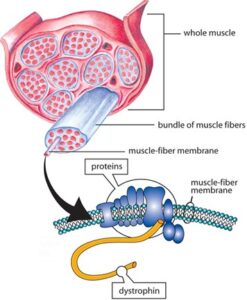Duchenne Muscular Dystrophy
What is Duchenne Muscular Dystrophy?
Duchenne muscular dystrophy (DMD) is the most common of nine muscular dystrophy disorders, and is characterized by progressive difficulty in walking and performing everyday activities. This lack of mobility is due to an absence of the protein dystrophin, causing muscles to deteriorate and break down. For more information about Duchenne Muscular Dystrophy click here.
Wallet Alert Cards
All members with DMD should receive one in the mail. If you require a wallet alert card please call 0800 800 337 or email info@mda.org.nz.
Duchenne Muscular Dystrophy Family Guide
The Duchenne Muscular Dystrophy Family Guide talks about the diagnosis and management of Duchenne muscular dystrophy.
For a printable version click here.
Please note: The Family Guide is available in several other languages. For a list of what is available please click here.
Duchenne Muscular Dystrophy – A Team Approach To Management
Duchenne Muscular Dystrophy – A Team Approach To Management is available for loan or purchase. This guidebook created by MontroseAccess outlines a multidisciplinary approach to the management of DMD and is a must have if you have a patient with this condition.
Contact the MDA National Office on 0800 800 337 or email info@mda.org.nz to order or request a loan.
There are more books available from the MDA Library.
Research
For more information about what is happening in the research area have a look at the Treat-NMD website.
Standards of Care
The standards of care for DMD was recently updated in 2018.
Part 2: Respiratory, cardiac, bone health, and orthopaedic management
Creatine Supplementation
Creatine monohydrate is a dietary supplement widely used in the body-building sector purported to cheaply increase muscle mass and gain muscle strength. It’s also been used by people with neuromuscular conditions for the same reasons but with a question mark over the evidence for its use. A practice brief, released by the Australian Centre of Research Excellence in Neuromuscular Disorders, supports the use of creatine in Duchenne muscular dystrophy and says that a recent Cochrane review and meta-analysis of dietary supplementation in DMD with creatine monohydrate have provided high-quality evidence of improved muscle strength, performance of activities of daily living, and patient/parent perceptions of health in the short- and intermediate-term. Click here for more information and dosage recommendations.
The psychology of Duchenne Muscular Dystrophy
Dutch Duchenne Parent Project in conjunction with Parent Project Muscular Dystrophy have produced this resource on the psychology of DMD. This booklet contains information about intelligence, learning, behaviour and other relevant issues associated with DMD. It is for parents, family members, teachers, paramedics and other persons involved in the care of an individual with DMD. Click here to view.
Physiotherapy
Not all muscles around a joint will weaken at the same time so boys will develop compensatory postures and ways of walking. This leads to tightening and ultimately shortening of these muscles. The goal of stretching is to preserve function and maintain comfort. The program of stretching will be monitored by the physiotherapist but needs to become part of the family’s daily routine. Have a look at this important information provided by Parent Project with regards to stretches and physiotherapy.
Support Groups
Kiwi Kids with DMD (Duchenne Muscular Dystrophy)
This is a Facebook support group for parents of Kiwi Kids with DMD. They describe themselves as ‘a group where we can all chat and share our experiences and ideas together, and support each other, friends, families and our Kiwi Kids with DMD. Anybody is welcome to join.
Useful Websites
Australia
Europe
USA
- Parent Project Muscular Dystrophy
- Your Genes Your Health – great information on the genetics of Duchenne muscular dystrophy

Dystrophin protein is needed for healthy muscle cell function. A genetic fault in the code for this protein means that there is little or no protein manufactured and the muscle cells are easily damaged. This damage builds up over time and leads to the muscle weakness experienced in DMD. Image sourced from https://mda.org.nz/disease/becker-muscular-dystrophy/causes-inheritance
Dinosaur Mac’s Discovery
Now back in stock! Thanks to an incredible donation of the final 500 books, we are selling copies for $10 each to fundraise towards the Bradley Jenkin Memorial Fund, to help boys with Duchenne muscular dystrophy and members of MDANZ with other neuromuscular conditions. To purchase your copy, please email info@mda.org.nz with Dinosaur Mac’s Discovery in the subject line.
Dinosaur Mac’s Discoverywas written by a mum with a son who has Duchenne muscular dystrophy, and is about a young boy who loves to play and run around, but can’t manage to do everything he wants to do because his muscles get sore and tired.
The author says it “follows a boy through the beginning stages of this condition. He wears a dinosaur tail everywhere which follows him on some of his ‘adventures’ like physio, Echocardiograms and so on. It is meant to be heartwarming, funny, while being real, and accurate.”
It is considered a great read-a-loud for junior and senior primary students.

